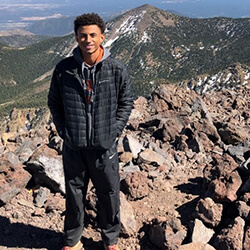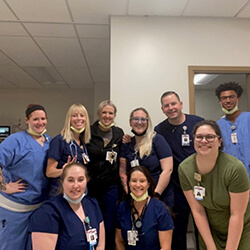White Coat Profile: Brandon Klor
Meet Brandon Klor

“I was at my primary care physician’s office, and I noticed a young African American woman was shadowing my doctor. She was the one who really inspired me. She told me there's a need and a place for me in medicine and really helped me to see that medicine is definitely something I want to do; and that it's possible.” While in college, he worked for the Hozhoni Foundation, which means “completed circle of harmony” in Navajo, in Flagstaff, Arizona. His interaction with patients who had intellectual and developmental disabilities opened his eyes to the need for health care for all patients. Other experiences at HonorHealth provided encouragement that he was making the best decision about his life and future.
“When I moved down to Phoenix, I started working in the emergency department as a patient care technician, and then I did some work in the operating room perioperative areas. That's when I realized there was opportunity for me to make a difference in people’s lives,” said Klor.
As he neared his decision to apply to medical school, he says his pre-health advisor gave him information about the University of Arizona College of Medicine – Phoenix.
“It was definitely one of my top choices — if not my top choice. Some of the doctors in the medical community around Phoenix also really put it on the map for me. I was super excited when I learned I had been admitted,” said Klor.
Another factor, which Klor acknowledges, is the overall shortage of physicians. This shortage is especially pronounced with African American men — who are not very well represented in medicine. He is committed to connecting with all patients, especially those from underrepresented communities.

“You see a lot of people come into the emergency room with illnesses that could be prevented if they had better primary care, sometimes even better specialty care. I'm still pretty open because of how broad the cases are that you see in the emergency department. My experiences have allowed me to keep an open mind about what I want to do in the future,” said Klor.
Like his fellow classmates in the Class of 2025, he is excited about participating in White Coat Ceremony. “White Coat Ceremony means a lot to me. The best way to put it is it means hope for the future to make a difference and to have an impact. My goal is to improve the health of the population and the individuals that I treat.”
About the College
Founded in 2007, the University of Arizona College of Medicine – Phoenix inspires and trains exemplary physicians, scientists and leaders to advance its core missions in education, research, clinical care and service to communities across Arizona. The college’s strength lies in our collaborations and partnerships with clinical affiliates, community organizations and industry sponsors. With our primary affiliate, Banner Health, we are recognized as the premier academic medical center in Phoenix. As an anchor institution of the Phoenix Bioscience Core, the college is home to signature research programs in neurosciences, cardiopulmonary diseases, immunology, informatics and metabolism. These focus areas uniquely position us to drive biomedical research and bolster economic development in the region.
As an urban institution with strong roots in rural and tribal health, the college has graduated more than 1,000 physicians and matriculates 130 students each year. Greater than 60% of matriculating students are from Arizona and many continue training at our GME sponsored residency programs, ultimately pursuing local academic and community-based opportunities. While our traditional four-year program continues to thrive, we will launch our recently approved accelerated three-year medical student curriculum with exclusive focus on primary care. This program is designed to further enhance workforce retention needs across Arizona.
The college has embarked on our strategic plan for 2025 to 2030. Learn more.